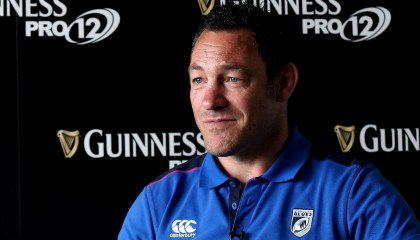Once upon a time, Cardiff were referred to as the greatest rugby club in the British Isles. A future Prime Minister said as much in the House of Commons during a debate on April 17, 1946 so it had to be true.
Hansard has recorded the words of the Right Honourable member for Cardiff South, James Callaghan, delivered with the authority of a man who had played in the centre for Streatham: 'Speaking as one who has the honour to represent the city which has the finest rugby club in the four home countries…'
They continued to sweep all before them during the early years of the post-war era including the All Blacks, overwhelmed 8-3 at the Arms Park in November 1953. Four weeks later six of the Cardiff team lined up against Bob Stuart's team and gave an encore, Wales winning the Test 13-8.
The famous club victory, as orchestrated by the late Cliff Morgan with two unanswered tries from Gwyn Rowlands and Sid Judd, required a reappraisal of Mr Callaghan's description. The finest club in the British Isles found itself swiftly upgraded to 'the greatest in the world.'
Some influential figures at the Arms Park had already taken that as read. Twenty years later Danny Davies, a former player and assistant manager on the 1955 Lions tour of South Africa, published the definitive history of the club entitled: 'The Greatest.'
Such a description is all very well but it does take a lot of living up to, as the most famous sportsman of the 20th century, Muhammad Ali, discovered during those colossal confrontations with George Foreman and Joe Frazier.
In rugby, the professional era changed the landscape beyond all recognition and not merely because in Cardiff's case it led to the rebranding of the Blue-and-Blacks as the Blues with the birth of regional rugby in Wales eleven years ago.
A new coach from New Zealand, Mark Hammett, and the imminent arrival of the Welsh-qualified fly half Gareth Anscombe from Auckland underlined the club's ambition to rediscover better times.
Adam Jones' relocation to the BT Arms Park would enable them to reunite the Lions' Test front row from the series against the Springboks in 2009 by putting him alongside Matthew Rees and Gethin Jenkins.
Sam Warburton, unleashed after a summer free of rugby following surgery, declared himself fitter than ever to take his place in a pack alongside the Fijian-Italian No. 8 Manoa Vosawai and the New Zealand Maori lock, Jarrad Hoeata. They would be in better shape for the Guinness PRO12 than they had been after three seasons thrashing about in the lower half of the table.
Five converted tries against Zebre in Italy got them off to a flying start before Glasgow's redoubtable Warriors introduced Hammett to some of the harsher realities of life at the upper levels of the PRO12. Gregor Townsend has imbued his team with such a winning knack that they turn a sin-binning to their advantage.
When Rhys Patchell brought the Blues to within a point with the penalty which left Gordon Reid staring at a yellow card, the Warriors wasted no time wondering about the consequences. Instead they made their opponents pay a price heavy enough to have put the result beyond reasonable doubt.
In the ten minutes without their substitute loosehead, last season's beaten Finalists scored 13 unanswered points. Nikola Matawalu had barely appeared from the bench than his electrifying impact put the skids under the Blues.
His juggling interception of a pass which Blues scrum half Lloyd Williams intended for his blindside wing, Dan Fish, required the most acrobatic of finishes. Matawalu's second, made by another substitute, Canadian wing DTH van der Merwe, wrapped it up.
The Blues stay at home this week, Ulster's visit on Friday evening representing a severe test of their powers of recovery. Ireland's northern province have inflicted some heavy punishment on the Welsh capital region over the last two seasons, piling up 17 tries in four largely one-sided matches.
The Warriors return to south-east Wales on Saturday to face the only club they failed to beat last season - the Dragons. They beat the Scots at Rodney Parade last February, 24-23, having overcome them much more convincingly in Glasgow the previous November, 23-8.
In the course of watching his team go within a whisker of dislodging the Ospreys from the top of the table last week, Dragons head coach Lyn Jones probably did something which had never been done before in the PRO12. He picked four teenagers.
Three of them were in the starting XV - Hallam Amos (19) on the right wing, Jack Dixon (19) in the centre alongside Tyler Morgan who had only turned 19 the day before the game. A fourth, Angus O'Brien, almost won the match with a last-minute drop shot.
The Ospreys, top of the heap after a 15th consecutive win over Welsh opposition, are no slouches either when it comes to youth. Nine of those on duty at Rodney Parade last week are 23 or under.
Connacht, out on their own as the only Irish province to have won both opening matches, will relish the challenge of making it three out of three at the expense of Leinster in Galway on Friday.
The champions will not have forgotten what happened to them there two years ago before a crowd of almost 9,000. Connacht blitzed them 5-0 on tries (Dave McSharry, Fetu'u Vainikolo, Tiernan O'Halloran, George Naoupu, Ronan Loughney) in winning 34-6 on a night when the then European Cup holders could manage nothing more than a pair of Ian Madigan penalties.
Follow us on Facebook, join the conversation on Twitter, sign up to our YouTube channel for extensive match highlights and sign up for our newsletter for regular updates on the GUINNESS PRO12
Guinness PRO12
Suite 208, Alexandra House,
The Sweepstakes
Ballsbridge, Dublin 4, Ireland














